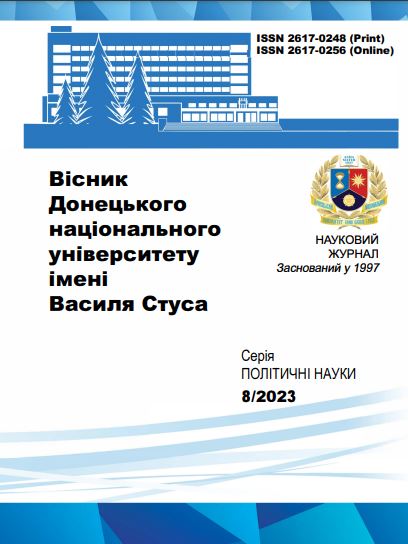Essential dimensions of national identity in the context of critical discourse analysis
DOI:
https://doi.org/10.31558/2617-0248.2023.8.5Keywords:
national identity; critical discourse analysis; identification; dimensions of identity; discursive construction of national identityAbstract
National identity is a complex and multi-component phenomenon that can be considered in the context of different approaches and methodologies. This article focuses on the constructivist approach to the interpretation of identity and critical discourse analysis as its direction. This article outlines different approaches to defining the dimensions of identity, in particular, M. Hibernau's approach, which identifies psychological, cultural, territorial, historical, and political dimensions, and L. Uhryn's approach, which identifies continuity, uniqueness, contextuality, dynamism, and structure as key dimensions of identity. The phenomenon of identification is also described as a process part of the micro-level of identity based on the statement that national identity is a product of discourse. The core in this context is the definition of thematic discourses, on the basis of which the process of internalization of identity takes place, namely: the search for common and different when a person compares himself with the image offered by the identity discourse.
The author's approach to delineating the dimensions of national identity is proposed. A brief description and examples for each dimension are provided. In particular, the psychological, behavioral, cultural, historical, esoteric, geographical, worldview, spatial, temporal, political, social, sociological, interactional, teleological, strategic, tactical, essential, formal-normative, personified-scenario, value, civilizational and ideological dimensions are defined national identity. These dimensions can be the thematic basis of the discursive construction of national identity because discursive strategies can be compilated in them for their effective implementation. From them also follows the distinction between discursive practices carried out within these strategies and outside them. The key role of the proposed dimensions in the process of discursive construction of national identity is to provide sufficient explanatory potential to the formed system of discursive strategies and practices.
References
Козловець М. А. Феномен національної ідентичності: виклики глобалізації: Монографія
/ М. А. Козловець. – Житомир: Видавництво ЖДУ ім. І. Франка, 2009. – 558 с.
Anderson B. Imagined Communities: Reflections on the Origins and Spread of Nationalism / Benedict Anderson. – London: Verso, 1983. – 271 с.
The Discursive Construction of National Identity / R.Wodak, M. Reisigl, R. de Cillia, K. Liebhart. – Edinburgh: Biddles Ltd, 2009. – 276 с. – (Edinburgh University Press).
Гібернау М. Ідентичність націй / Монтсеррат Гібернау. – Київ: Темпора, 2012. – 304 с.
Угрин Л. Я. Сутність та основні виміри політичної ідентичності: теоретичний аналіз / Л. Я. Угрин. // S.P.A.C.E. – 2017. – №3. – С. 9–13.
Кримський С. Б. Під сигнатурою Софії / Сергій Борисович Кримський. – Київ: Києво-Могилянська академія, 2008. – 368 с.
Kolakowski L. Über kollektive Identität / Leszek Kolakowski // Identität im Wandel: Castelgandolfo-Gespräche / Leszek Kolakowski. – Stuttgart: Institut für die Wissenschaften vom Menschen, 1995. – С. 47–60.
Van Dijk T. A., 2017. Sociocognitive Discourse Studies. The Routledge Handbook of Critical Discourse Studies / Ed. by John Flowerdew, John E. Richardson. London: Routledge, Р. 26–43.
Wodak R. Methods of critical discourse analysis / R. Wodak, M. Meyer. London: Biddles Ltd, 2001. 200 с. (SAGE Publications Ltd).

